
Abraham Lincoln was an American lawyer, politician, and statesman who served as the 16th president of the United States from 1861 until his assassination in 1865. He led the United States through the American Civil War, defending the nation as a constitutional union, defeating the insurgent Confederacy, playing a major role in the abolition of slavery, expanding the power of the federal government, and modernizing the U.S. economy.

The American Civil War was a civil war in the United States between the Union and the Confederacy, which was formed in 1861 by states that had seceded from the Union. The central conflict leading to war was a dispute over whether slavery should be permitted to expand into the western territories, leading to more slave states, or be prohibited from doing so, which many believed would place slavery on a course of ultimate extinction.

The Emancipation Proclamation, officially Proclamation 95, was a presidential proclamation and executive order issued by United States President Abraham Lincoln on January 1, 1863, during the American Civil War. The Proclamation had the effect of changing the legal status of more than 3.5 million enslaved African Americans in the secessionist Confederate states from enslaved to free. As soon as slaves escaped the control of their enslavers, either by fleeing to Union lines or through the advance of federal troops, they were permanently free. In addition, the Proclamation allowed for former slaves to "be received into the armed service of the United States". The Emancipation Proclamation played a significant part in the end of slavery in the United States.

The Reconstruction era was a period in United States history and Southern United States history that followed the American Civil War and was dominated by the legal, social, and political challenges of the abolition of slavery and the reintegration of the eleven former Confederate States of America into the United States. During this period, three amendments were added to the United States Constitution to grant citizenship and equal civil rights to the newly freed slaves. To circumvent these legal achievements, the former Confederate states imposed poll taxes and literacy tests and engaged in terrorism to intimidate and control people of color and to discourage or prevent them from voting.
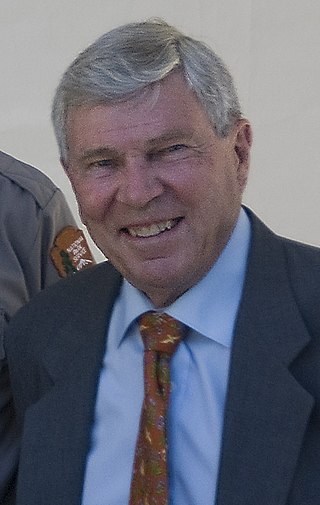
James Munro McPherson is an American historian specializing in the American Civil War. He is the George Henry Davis '86 Professor Emeritus of United States History at Princeton University. He received the 1989 Pulitzer Prize for Battle Cry of Freedom: The Civil War Era. McPherson was the president of the American Historical Association in 2003.

Neo-Confederates are groups and individuals who portray the Confederate States of America and its actions during the American Civil War in a positive light. The League of the South, the Sons of Confederate Veterans and other neo-Confederate organizations continue to defend the secession of the former Confederate States.

Thomas James DiLorenzo is an American author and former university economics professor who is the President of the Ludwig von Mises Institute. He has written books denouncing President Abraham Lincoln.

Eric Foner is an American historian. He writes extensively on American political history, the history of freedom, the early history of the Republican Party, African American biography, the American Civil War, Reconstruction, and historiography, and has been a member of the faculty at the Columbia University Department of History since 1982. He is the author of several popular textbooks, such as the Give Me Liberty series for high school classrooms. According to the Open Syllabus Project, Foner is the most frequently cited author on college syllabi for history courses. According to historian Timothy Snyder, Foner is the first to associate the storming of the Capitol on January 6, 2021 with section three of the Fourteenth Amendment to the Constitution.
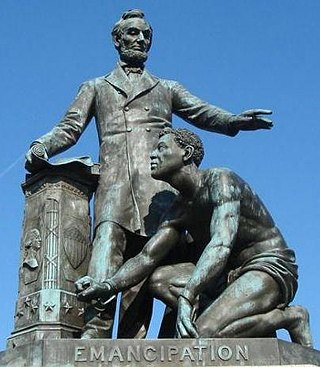
Abraham Lincoln's position on slavery in the United States is one of the most discussed aspects of his life. Lincoln frequently expressed his moral opposition to slavery in public and private. "I am naturally anti-slavery. If slavery is not wrong, nothing is wrong," he stated. "I can not remember when I did not so think, and feel." However, the question of what to do about it and how to end it, given that it was so firmly embedded in the nation's constitutional framework and in the economy of much of the country, even though concentrated in only the Southern United States, was complex and politically challenging. In addition, there was the unanswered question, which Lincoln had to deal with, of what would become of the four million slaves if liberated: how they would earn a living in a society that had almost always rejected them or looked down on their very presence.
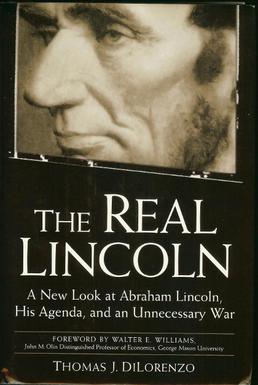
The Real Lincoln: A New Look at Abraham Lincoln, His Agenda, and an Unnecessary War is a biography of Abraham Lincoln written by Thomas J. DiLorenzo, a former professor of economics at Loyola University Maryland, in 2002. He was severely critical of Lincoln's United States presidency.
Neoabolitionist is a term used in historiography to characterize historians of race relations motivated by the spirit of racial equality typified by the abolitionists who fought to abolish slavery in the mid-19th century. They write especially about African-American history, slavery in the United States, the American Civil War and the Reconstruction Era.
The ten percent plan, formally the Proclamation of Amnesty and Reconstruction, was a United States presidential proclamation issued on December 8, 1863, by United States President Abraham Lincoln, during the American Civil War. By this point in the war, the Union Army had pushed the Confederate Army out of several regions of the South, and some Confederate states were ready to have their governments rebuilt. Lincoln's plan established a process through which this postwar reconstruction could come about.

Lerone Bennett Jr. was an African-American scholar, author and social historian who analyzed race relations in the United States. His works included Before the Mayflower (1962) and Forced into Glory (2000), a book about U.S. President Abraham Lincoln.

Allen Carl Guelzo is an American historian who serves as the Thomas W. Smith Distinguished Research Scholar and Director of the Initiative on Politics and Statesmanship in the James Madison Program at Princeton University. He formerly was a professor of History at Gettysburg College.
James Oakes is an American historian, and is a Distinguished Professor of History and Graduate School Humanities Professor at the Graduate Center of the City University of New York where he teaches courses on the American Civil War and Reconstruction, Slavery, the Old South, Abolitionism, and U.S. and World History. He taught previously at Princeton University and Northwestern University.
Historiography examines how the past has been viewed or interpreted. Historiographic issues about the American Civil War include the name of the war, the origins or causes of the war, and President Abraham Lincoln's views and goals regarding slavery.
This bibliography of Abraham Lincoln is a comprehensive list of written and published works about or by Abraham Lincoln, the 16th president of the United States. In terms of primary sources containing Lincoln's letters and writings, scholars rely on The Collected Works of Abraham Lincoln, edited by Roy Basler, and others. It only includes writings by Lincoln, and omits incoming correspondence. In the six decades since Basler completed his work, some new documents written by Lincoln have been discovered. Previously, a project was underway at the Papers of Abraham Lincoln to provide "a freely accessible comprehensive electronic edition of documents written by and to Abraham Lincoln". The Papers of Abraham Lincoln completed Series I of their project The Law Practice of Abraham Lincoln in 2000. They electronically launched The Law Practice of Abraham Lincoln, Second Edition in 2009, and published a selective print edition of this series. Attempts are still being made to transcribe documents for Series II and Series III.
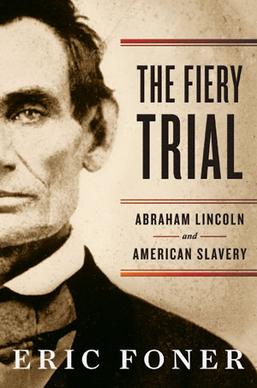
The Fiery Trial: Abraham Lincoln and American Slavery is a historical non-fiction book written by American historian Eric Foner. Published in 2010 by W. W. Norton & Company, the book serves as a biographical portrait of United States President Abraham Lincoln, discussing the evolution of his stance on slavery in the United States over the course of his life. The Fiery Trial, which derives its title from Lincoln's Annual Message to Congress of December 1, 1862, was the 22nd book written by Foner, the DeWitt Clinton Professor of History at Columbia University. It was praised by critics and won the 2011 Pulitzer Prize for History, the Bancroft Prize, and the Lincoln Prize.
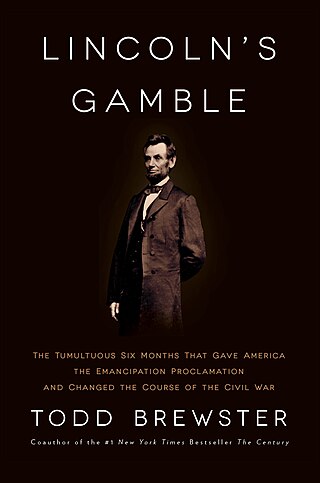
Lincoln's Gamble: The Tumultuous Six Months that Gave America the Emancipation Proclamation and Changed the Course of the Civil War is a book by Todd Brewster, an American author, academic, journalist, and film producer.
This article documents the political career of Abraham Lincoln from the end of his term in the United States House of Representatives in March 1849 to the beginning of his first term as President of the United States in March 1861.














